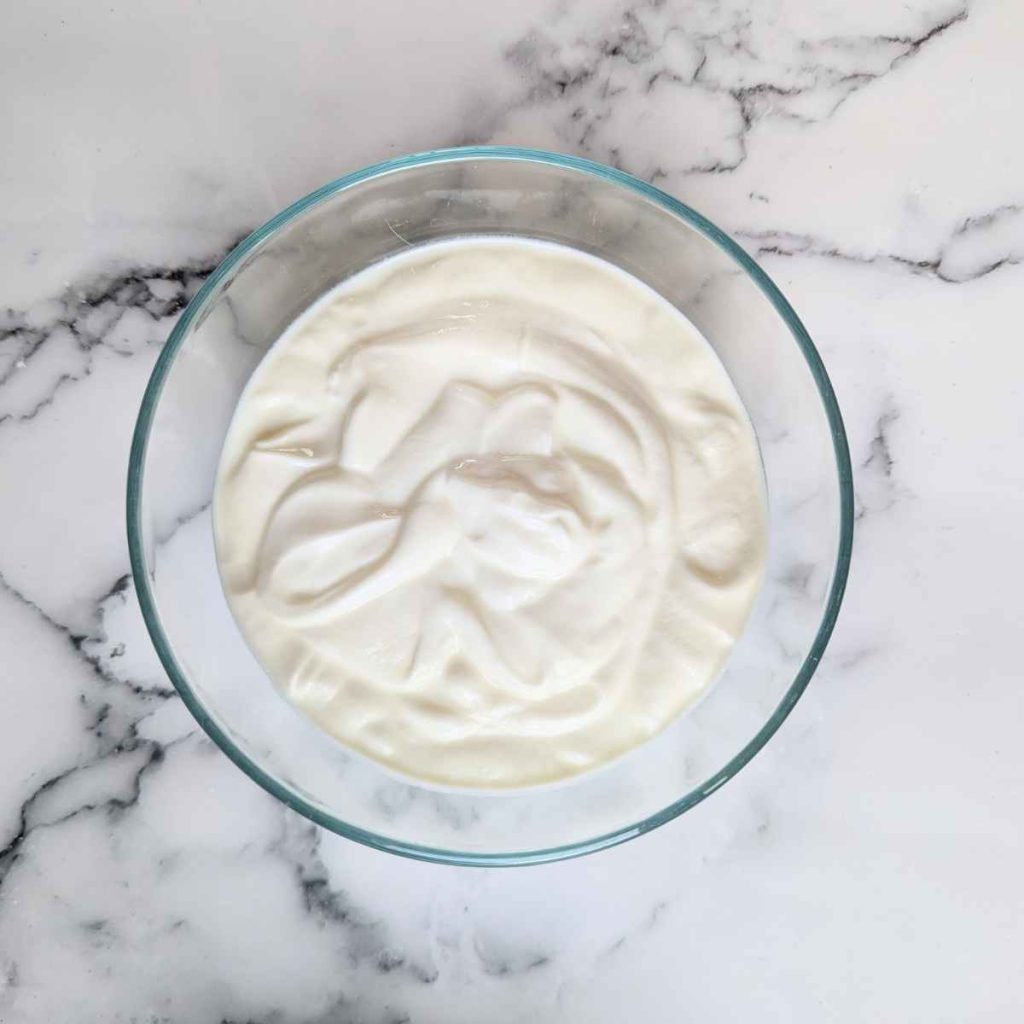What is the best Yogurt for Babies? Although yogurt can be a great choice as a first food for your baby, there are some things to consider beforehand.

I’ll take you through the ins and outs of picking the perfect yogurt for your little one, plus I’ll include some fun and yummy ways to use yogurt for snacks!
This post contains affiliate links, which means I make a small commission at no extra cost to you. See my full disclosure here.
Pin it for later -Best Yogurt for Babies

Why yogurt?
If you didn’t know already, yogurt is a great source of protein. Which is super important for growing babies!
Yogurt is packed with probiotics or live active cultures. The “good bacteria” everyone is talking about for your gut.
Yogurt is a good source of calcium. Perfect for those growing bones!
Yogurt is a good choice for babies because it’s easy to spoon feed without any additional prep but also pairs well with so many other foods. It has a smooth texture which is easy for babies to eat.
We mixed yogurt with peanut butter as a way to introduce peanuts regularly to our babies. -Don’t forget to ask your child’s primary care provider before introducing new foods.
When can babies have yogurt?
Yogurt is usually safe for babies 6 months and older. Be sure to run this by their provider for approval first.

Picking a baby-friendly yogurt
- Whole milk (full-fat) – this is best for brain development. You want to avoid fat free or other lower fat options. These usually come with other additives anyways
- Plain & unsweetened- Plain yogurt avoids added sugars or artificial sweeteners. Even ones with fruit mixed in tend to have added sweeteners. You can always mash a banana to stir in, if you are wanting to sweeten the yogurt some.
- No artificial flavors or colors– Most of the yogurt marketed for kids are going to have flavors and colors added. Avoid these. All you need are plain and unsweetened.
- Greek Yogurt– Greek yogurt has more protein than regular yogurt. If I have the choice, I usually go for this option instead of regular yogurt. Greek yogurt will be thicker and more tangy. If you’ve tried Greek yogurt and your baby didn’t care for it, you can always try regular yogurt too!
- Organic– This can be optional, but I chose to go with an organic brand. Keep in mind, just because a yogurt is organic, doesn’t mean there won’t be other added ingredients you want to avoid.
- Read the ingredient label– The yogurt I buy has two ingredients in the list: 1. whole milk and 2. Active live cultures.
What about homemade yogurt?
Homemade yogurt is a wonderful option! It really only takes 2 ingredients and some time. It’s more cost effective and you can control the ingredients in your baby’s food. You want to be cautious to ensure proper fermentation and food safely. Here is a great resource for making your own yogurt.
How to Serve Yogurt to Babies
- As-is, on a spoon– Can’t get any easier than that!
- Mixed with fruit or veggie purée– Add a mashed banana or other mashed fruit. You can even add yogurt to a veggie puree. Sweet potatoes or carrots are a good option.
- In smoothies– Smoothies are so easy and the flavor combos are endless. You can easily freeze leftovers for later. For babies or toddlers, spoon 2-3 tablespoons in your favorite smoothie recipe. Here you’ll find my kids favorite oatmeal smoothie recipe.
- On top or mixed in with oatmeal.
- Freeze your favorite smoothies with yogurt into popsicles.
- Load these reusable baby food pouches with a yogurt smoothie, or pureed mixture and freeze for later.

FAQ
What age can babies eat yogurt?
Babies can usually start eating yogurt at 6 months of age and up. Be sure to check with your provider first. Before starting any solid foods, consult with your provider.
What if my baby has a dairy sensitivity?
Since yogurt is a dairy product, you’ll want to avoid feeding it to babies with a dairy sensitivity or milk allergy.
There are dairy alternative yogurts. Many of these contain fillers and additives, so you’ll want to read the label carefully before considering feeding it to your baby.
Many plant-based yogurts (like coconut yogurt) won’t have the protein content either. Unless it is added in with other ingredients.
Can babies eat Greek yogurt?
Yes! Greek yogurt has more protein than regular yogurt and is a great option!
How much yogurt is okay per day?
Start with small amounts and see how your baby tolerates the dairy. Start with 1-2 teaspoons and work your way up. Like introducing any new food, observe your baby for any allergic reaction if feeding them diary for the first time.
Tips for parents
- Introduce yogurt slowly and watch for reactions. Start with a small amount and work your way up to larger servings.
- Make it fun—experiment with textures and flavors. Mashed fruit or smoothies are usually a hit with babies. Some babies take to solid food slower than others. Keep trying new foods and re-try foods your baby didn’t like later multiple times. It would be best to stick with whole foods (that are mashed or pureed) instead of adding fruit juice to sweeten the yogurt. Homemade applesauce is a good choice too!
- Always consult your pediatrician for personalized advice.
Baby yogurt recipe
- 1/4 cup whole milk yogurt
- 1 teaspoon creamy (no added sugar) peanut butter
- 1/2 banana mashed
When your baby gets older, you can start to add whole fruit cut into small pieces or fruit chunks for an easy, healthy breakfast.
For older children, you can really get creative and experiment with flavors. Adding vanilla, a little maple syrup and cocoa to make a delicious dessert.
For toddlers or young children still keep in mind sugar content and go with less sugar to start with. Even if it’s honey (for 1 year old and up) or maple syrup.
Yogurt is a nutritious and versatile first food. It’s convenient and easy to feed to little babies. With the right kind of yogurt, it can support your baby’s growth and development.
Laying the foundation of healthy eating habits early on is one of the most important things we can do for our kids.
My final advice on the best yogurt for babies.
Take a trip to the grocery store, walk the yogurt aisle and read all the ingredient list of the plain unsweetened yogurt available. Some will come with pectin (even the organic yogurt), which I like to avoid.
Sometimes, you won’t be able to find an organic, whole milk, Greek yogurt that is plain and unsweetened. It can be hard to find a yogurt that checks all the boxes.
Do your best. The main thing is that it is full fat with no sweeteners or flavors added.
You have so much to learn and get through your baby’s first year, but the good news is, things get easier once you find a rhythm and products you know you can trust.
It just takes a lot of work in the beginning. I hope this provided helpful information along the way!
How was your baby’s first experience with yogurt? What is your favorite way to serve yogurt to your baby or toddler?

Leave a Reply